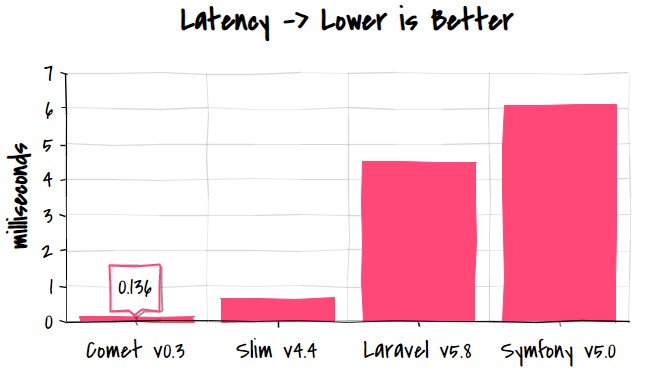Comet is a modern PHP framework for building fast REST APIs and microservices.
- Blazing fast with 100K HTTP requests per second and ~0.1 ms latency on commodity cloud hardware
- Really cross-platform, works like a charm on Linux, MacOS and Windows 7/8/10
- Based on bullet-proof components from Guzzle, SlimPHP and Workerman
- Extendable with Composer: use ORM and templating engine of your choice
- PSR compliant with native implementations of all PSR-7 interfaces
- Has its own HTTP client with simple interface
Comet gets all superpowers from Guzzle, Slim and Workerman components as well as adds its own magic.
Guzzle is a set of PHP components to work with HTTP/1.1 and HTTP/2 services.
Slim is a micro-framework that helps write web applications and APIs based on modern PSR standards.
Workerman is an asynchronous event-driven framework to build fast and scalable network applications.
Comet allows you natively use all the methods of Slim: http://www.slimframework.com/docs/v4/
PHP is often criticized for its low throughput and high latency. But that is not necessarily true for modern frameworks. Let's see how Comet outperforms others.
As you can see, the right architecture provides it with tenfold advantage over Symfony and other popular frameworks.
How long it takes to get response from API often is even more important than overall service throughput. And that is where Comet really shines!
Comet provides sub-millisecond latency for typical scenarios. Even under hard pressure of thousand concurrent connections it can compete with frameworks of compiled platforms like Go and Java.
You may run all benchmarks on your own to be sure charts are not scam: https://github.com/gotzmann/benchmarks
It is recommended that you use Composer to install Comet.
$ composer require gotzmann/cometThis will install framework itself and all required dependencies. Comet requires PHP 7.1 or newer.
Create single app.php file at project root folder with content:
<?php
require_once __DIR__ . '/vendor/autoload.php';
$app = new Comet\Comet();
$app->get('/hello',
function ($request, $response) {
return $response
->with("Hello, Comet!");
});
$app->run();Start it from command line:
$ php app.php startThen open browser and type in default address http://localhost:8080 - you'll see hello from Comet!
Let's start Comet server listening on custom host:port and returning JSON payload.
<?php
require_once __DIR__ . '/vendor/autoload.php';
$app = new Comet\Comet([
'host' => '127.0.0.1',
'port' => 8080,
]);
$app->get('/json',
function ($request, $response) {
$data = [ "message" => "Hello, Comet!" ];
return $response
->with($data);
});
$app->run();Start browser or Postman and see the JSON resonse from GET http://127.0.0.1:8080
Before you proceed with complex examples, be sure that your composer.json contains "autoload" section like this:
{
"require": {
"gotzmann/comet": "^0.6",
},
"autoload": {
"psr-4": { "App\\": "src/" }
}
}If not, you should add the section mentioned above and update all vendor packages and autoload logic by command:
$ composer updateCreate src/Controllers/SimpleController.php:
<?php
declare(strict_types=1);
namespace App\Controllers;
use Comet\Request;
use Comet\Response;
class SimpleController
{
private static $counter = 0;
public function getCounter(Request $request, Response $response, $args)
{
$response->getBody()->write(self::$counter);
return $response->withStatus(200);
}
public function setCounter(Request $request, Response $response, $args)
{
$body = (string) $request->getBody();
$json = json_decode($body);
if (!$json) {
return $response->withStatus(500);
}
self::$counter = $json->counter;
return $response;
}
} Then create Comet server app.php at project root folder:
<?php
declare(strict_types=1);
use Comet\Comet;
use App\Controllers\SimpleController;
require_once __DIR__ . '/vendor/autoload.php';
$app = new Comet([
'host' => 'localhost',
'port' => 8080,
]);
$app->setBasePath("/api/v1");
$app->get('/counter',
'App\Controllers\SimpleController:getCounter');
$app->post('/counter',
'App\Controllers\SimpleController:setCounter');
$app->run();Now you are ready to get counter value with API GET endpoint. And pay attention to '/api/v1' prefix of URL:
GET http://localhost:8080/api/v1/counter
You can change counter sending JSON request for POST method:
POST http://localhost:8080/api/v1/counter with body { "counter": 100 } and 'application/json' header.
Any call with malformed body will be replied with HTTP 500 code, as defined in controller.
Comet allows you to debug application showing errors and warnings on the screen console. When you move service to the production it better to use file logs instead. Code snippet below shows you how to enable on-the-screen debug and logging with popular Monolog library:
<?php
declare(strict_types=1);
use Comet\Comet;
use Monolog\Logger;
use Monolog\Handler\StreamHandler;
use Monolog\Formatter\LineFormatter;
require_once __DIR__ . '/vendor/autoload.php';
$formatter = new LineFormatter("\n%datetime% >> %channel%:%level_name% >> %message%", "Y-m-d H:i:s");
$stream = new StreamHandler(__DIR__ . '/log/app.log', Logger::INFO);
$stream->setFormatter($formatter);
$logger = new Logger('app');
$logger->pushHandler($stream);
$app = new Comet([
'debug' => true,
'logger' => $logger,
]);
$app->run();Please see Dockerfile at this repo as starting point for creating your own app images and containers.
If you would like to use Nginx as reverse proxy or load balancer for your Comet app, insert into nginx.conf these lines:
http {
upstream app {
server http://path.to.your.app:port;
}
server {
listen 80;
location / {
proxy_pass http://app;
proxy_redirect off;
}
}
} 

